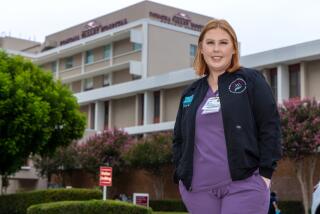Lightening the Load
- Share via
Hospital interns and residents have traditionally worked long, grueling hours--sometimes 36-hour shifts and 100-hour weeks. Do these long hours affect the ability of residents to care adequately for patients? This question raises a swirl of controversy that cannot be separated from the issues of labor costs in hospitals, the revolution in medical technology, the changing nature of the medical profession and the proper way to train the next generation of doctors.
Nationally, the practice of making interns and residents work long hours has come under particular scrutiny since the death in 1984 of Libby Zion, a young woman who died eight hours after being admitted to New York Hospital complaining of a fever. A Manhattan grand jury said that the 18-year-old had received “woefully” inadequate care and that repeated mistakes had been made by unsupervised first-year interns and second-year residents who had had little sleep. Last June New York state approved new regulations to limit a single shift for young doctors to 24 hours and a work week to 80 hours, averaged over four weeks, effective next July.
At issue is whether California will follow New York and regulate the hours of residents. Last week the Journal of the American Medical Assn. published a study arguing that fatigue and lack of sleep do not impair the performances of residents. But a study released in May by the California Board of Medical Quality Assurance indicates otherwise. A survey of California medical residents found that 67% of them reported that they had observed a situation in which stress and fatigue due to residents’ long working hours had resulted in inadequate patient care; 51% said that they themselves had participated in the rendering of such inadequate care.
Proponents of reducing residents’ on-call hours argue that the technology used for diagnosis and treatment is far more complex today than it was 10 or 15 years ago and that a subtle error of judgment can be lethal. Fatigue also impairs the ability of residents to learn. Finally, residents protest being a pool of cheap labor. Residents earn $21,000 to $35,000 a year, but because of the number of hours that they work their pay sometimes averages out to less than $5 an hour.
Opponents of reform argue that long hours are essential to medical training. They point out that it is important for young doctors to follow the progress of patients to learn how disease and healing occur. Specialties vary in their demands, and ironically some residents like surgeons, who report the longest hours, often complain less than do residents in internal medicine or pediatrics, who average fewer total hours. Finally, shorter hours for residents will cost a large amount of money--as much as $100 million a year in California--at a time when the public is already alarmed at the skyrocketing cost of medical care.
The Board of Medical Quality Assurance has been authorized by the California Legislature to study the question of cost over the next year. In the interim, California’s teaching hospitals must begin to reform their residence programs to make them more humane for young doctors and to ensure first-quality care of their patients.
More to Read
Sign up for Essential California
The most important California stories and recommendations in your inbox every morning.
You may occasionally receive promotional content from the Los Angeles Times.













